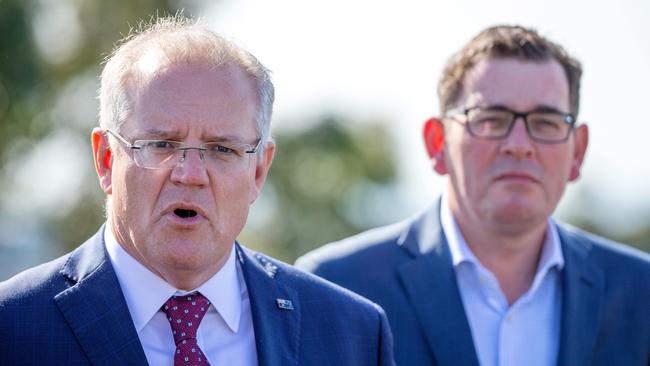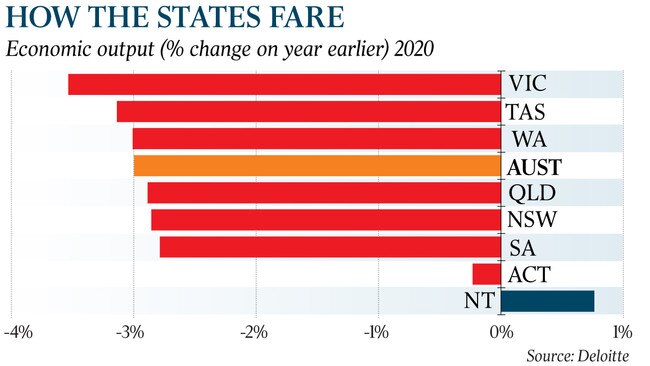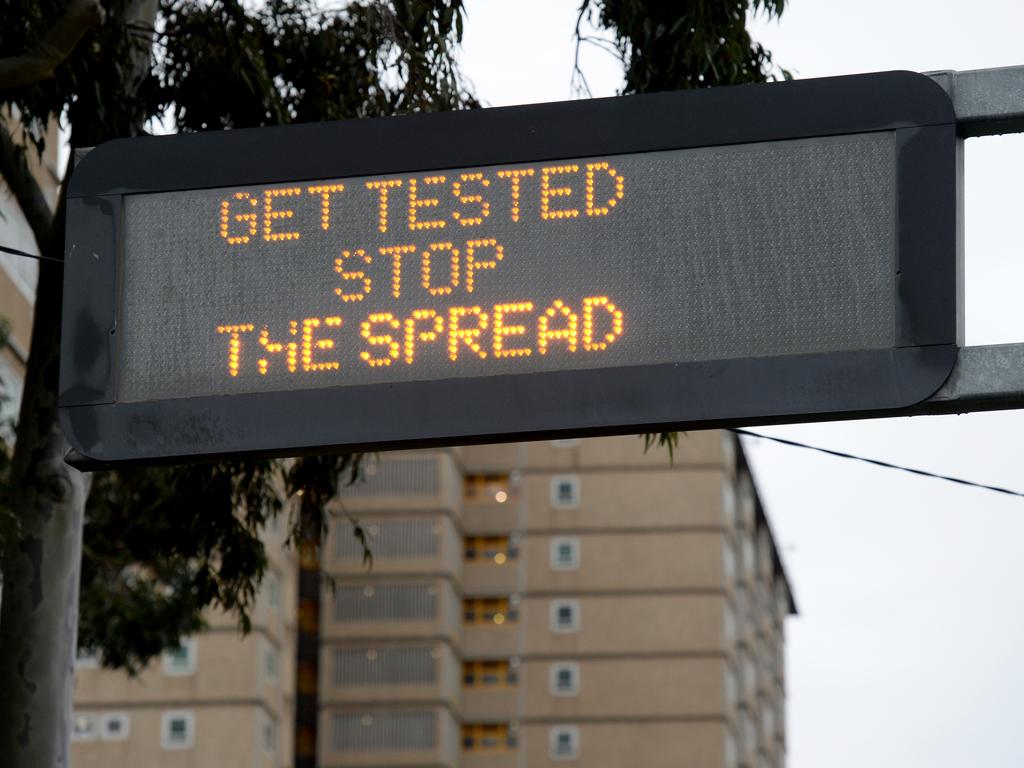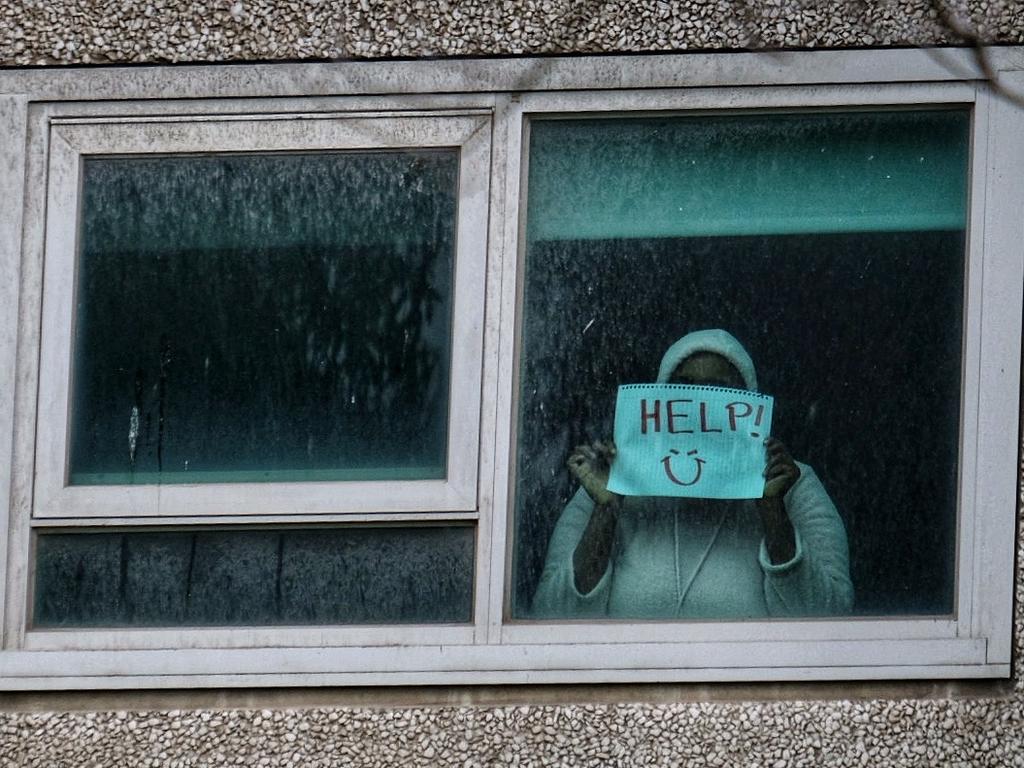Victoria’s coronavirus failure a threat to national recovery
Economic growth will contract by 3 per cent in 2020 in part beacuse of Victoria’s virus disaster, warns a Deloitte report.

Victoria’s failure to contain the spread of COVID-19 will stall Australia’s recovery, with the state’s health crisis, combined with a drop in migration and crash in consumer spending, threatening the nation’s economic growth and delaying reopening international borders.
A Deloitte Access Economics Business Outlook report released on Monday predicts economic growth will contract by 3 per cent in 2020, but says Victoria will be one of the hardest hit as it plunges into lockdowns sparked by the new COVID-19 outbreak in Melbourne.
As NSW, Queensland, South Australia and Western Australia moved to unlock the bulk of COVID-19 restrictions which have crippled the hospitality, tourism, services and aviation sectors, Victorian businesses continue to face tougher rules.
The economic shock in Victoria, which accounts for one- quarter of the nation’s GDP, will deliver a major blow to the Andrews government when it hands down its budget later this year and trigger ripple effects across Australia.
Deloitte Access Economics partner Chris Richardson said Australia’s economy had been hit by a COVID-19 “sledgehammer” and was being “held together by lots of sticky-tape”.
Mr Richardson said Victoria’s “dependence on migration and on foreign students in an age of lockdowns and closed borders” had left it more exposed than other jurisdictions.
“Victoria is likely to take the unwanted title of worst performing state through the COVID crisis. Population, once a key growth engine, has well and truly stalled,” Mr Richardson said.
“And Victoria’s case numbers were spiking as we went to press. The need for tighter restrictions has sent job losses soaring and consumers hanging on to their cash rather than spending it. Infrastructure is the bright spot in this dark near-term outlook until the economy can open back up.”
The fight over JobKeeper, due to end in September, will erupt this week ahead of Josh Frydenberg finalising the future of the wage subsidy scheme by the government’s July 23 economic update.
The Treasurer said Labor’s calls to expand the $70bn JobKeeper program would have cost $28bn through to September, not including suggestions for the government to buy into Virgin Australia and continue free childcare.

Mr Frydenberg said the extra cost was based on Labor’s push to extend JobKeeper to 1.1 million casuals ($5.7bn), one million temporary visa holders ($19.5bn) and 140,000 university workers ($2.7bn). If JobKeeper eligibility was expanded, the scheme would be paying out $15bn a month.
“Labor’s hypocrisy has no bounds. On one hand they decry an increased deficit which is the direct result of COVID-19, and at the same time they are asking the government to spend more,” Mr Frydenberg told The Australian. “The government’s economic support has been temporary and targeted so as not to have a structural impact on the budget, helping us maintain our AAA credit rating.”
Coalition MPs Jason Falinski and Andrew Laming have called for the JobKeeper and JobSeeker programs to be better targeted.
In the Deloitte report, titled Fast crisis, slow recovery, Mr Richardson said there was no point in keeping businesses alive through JobKeeper if they were destined to shut.
“Wage subsidies gradually become less helpful the longer they’re used as emergency support. There are rising costs in simply keeping zombie jobs alive.
“That doesn’t say pull back overall spending support, but it does say this particular type of support should gradually fade in importance in our defence against the virus. Keeping JobSeeker stronger for longer will be vital in filling the cracks as emergency safety nets morph or disappear.”
Mr Richardson said the government would need to continue rolling out targeted packages similar to its infrastructure and HomeBuilder stimulus packages to ensure that too much support didn’t end at the same time.
“In some cases, that may mean an earlier end, but in most cases it’ll be later. And we should phase support out where we can,” he said. “Some type of ongoing wage subsidy — a JobTweaker — will be needed, too, limited to a rather smaller range of businesses (such as those tied to international borders). And the dollars per person may need to be lower too.”
Opposition Treasury spokesman Jim Chalmers said the Deloitte report made it clear that “support should not be rapidly withdrawn in September”.
“Millions of workers and thousands of businesses are anxious about being left out and left behind in Australia’s first recession in three decades,” he said.
“The Morrison government’s failure to take workers and employers into their confidence about their secret plans for after September has created too much uncertainty and seen businesses shed jobs and push more workers into jobless queues.
“Support could be better targeted or tapered, but it shouldn’t snap back on an arbitrary timeline which doesn’t reflect the reality in workplaces and communities.”
Mr Falinski, a member of the standing economics committee, said the JobKeeper program needed to become more targeted. He called for mutual obligation to be reinstated for JobSeeker recipients: “There are yoga teachers who’ve gone from $200 a fortnight to $1500 — even they think it’s crazy. And cafes are struggling to get their workers to return.”
Mr Laming said the tax office had access to data, “including GST from each of the nation’s regions and sectors”, which should be used to ensure that when turnover from a sector exceeded a threshold, “those businesses need to stand on their own two feet”.
“Any business subsequently laying off staff could opt-in for a JobKeeper payment for those laid-off individuals to cushion the transition,” the Queensland LNP MP told The Australian.
The Deloitte report cited downturns in migration, international border closures and unemployment as key factors in the nation’s road to economic recovery, warning that the construction, professional services, entertainment, retail, aviation and tourism sectors would be hard hit. The report predicts there will be 55,000 net migrant arrivals in 2020-21, 150,000 in 2021-22 and 235,000 in 2022-23.
Mr Frydenberg said “there are now positive signs the economy is on the road to recovery, with Deloitte upgrading its outlook for the Australian economy”.
“Deloitte forecasts the Australian economy to contract 3.0 per cent in 2020 before bouncing back 4.7 per cent in 2021,” he said. “This is an upgrade of 2.2 percentage points in 2020 and 3.5 percentage points in 2021 compared to its March forecasts.
“These are encouraging signs as our economy begins to reopen but we must continue to be vigilant as the recent spike in cases in Victoria illustrates.”
Mr Richardson, who said the “recession may well have passed its worst”, warned of “phantom menaces”, including a push to pay off the new debt quickly, which he said was not “smart play” because it would flatten the economy.
“Another phantom menace is the belief that even if we don’t pay off the debt, we have to raise taxes and cut spending to fix the budget. That’s completely wrong, and it unnecessarily scares the punters.”
Additional reporting: Adam Creighton








To join the conversation, please log in. Don't have an account? Register
Join the conversation, you are commenting as Logout